Veterinary Advice Online - Sexing Rabbits (Rabbit Gender Determination).
Rabbits are social creatures who enjoy the company of other rabbits. Unfortunately, however,
pet bunny rabbits do breed rampantly ("they breed like rabbits") and two pet rabbits of the opposite sex can very quickly produce dozens of offspring if they are inadvertently housed together. For this reason - to avoid rabbits of the opposite sex being placed
into the same hutch together - it is important for rabbit owners to be able to accurately determine the gender of their rabbit pets.
Many owners of rabbits find it very difficult to determine the gender or sex of their pets, particularly newborn rabbit kittens, and often need their veterinarian to sex their rabbits for them.
But sexing rabbits is actually easy when you know how.
This page contains everything you, the pet owner, need to know about sexing rabbits (rabbit gender determination). The "
how to sex rabbits" information provided on this page is supported by a number of helpful male and female rabbit pictures and photos of rabbit genital anatomy that clearly illustrate how to distinguish the boys from the girls.
Rabbit sexing topics are covered in the following order:
1. Some basic dos and do nots when handling and sexing rabbits for the first time.
2. A pictorial guide to how to sex rabbits - is your rabbit male or female?
 WARNING - IN THE INTERESTS OF PROVIDING YOU WITH COMPLETE AND DETAILED INFORMATION, THIS PAGE DOES CONTAIN IMAGES AND PHOTOS OF RABBIT ANATOMY THAT SENSITIVE READERS MAY POTENTIALLY FIND EXPLICIT.
WARNING - IN THE INTERESTS OF PROVIDING YOU WITH COMPLETE AND DETAILED INFORMATION, THIS PAGE DOES CONTAIN IMAGES AND PHOTOS OF RABBIT ANATOMY THAT SENSITIVE READERS MAY POTENTIALLY FIND EXPLICIT.

1. Some basic dos and do nots when handling and sexing rabbits for the first time.
There is not too much that can go wrong when attempting to determine the sex or gender of a rabbit,
so long as you are gentle, however, I will draw your attention to a couple of important rabbit handling dos and do nots, which should be taken into consideration.
DO:
- Handle pet rabbits very gently and quietly. Bunnies are easily scared and will struggle and kick when frightened (which doesn't help in trying to determine their gender).
- Hold your rabbit firmly but gently around its body (chest and shoulders) and support its bottom so that it can not kick. Scared rabbits can kick or leap out of your hands if held loosely or incorrectly, resulting in injury to the rabbit (e.g. falling off a table top or breaking its spine through kicking actions) or owner (bites, scratches). Having one person hold the rabbit while another sexes it can be helpful.
- Perform rabbit sexing or any rabbit examination on the floor or on a very low table (e.g. short coffee table). This way, if the animal struggles and gets away, no injury will occur as a result of the animal falling from a great height.
- Rest your rabbits on a clean towel on their backs or rumps (holding them firmly so that they cannot kick, of course) or supported firmly in your hands on their rumps to examine their genitals. Rabbit genitalia is more easily examined when the animal is sitting on its bottom or back.
- Where possible, wait until baby rabbits are weaned (over 6 weeks of age) before trying to determine their gender. This will reduce the risk of the mother rabbit rejecting her newborn rabbit babies because of your smell.
- Put baby rabbits back with their mother immediately if they become distressed from handling.
- If you have to handle and sex newborn rabbits, wear disposable gloves (so you don't pass any diseases on to them) and do so in a warm area and for no more than 5 minutes at a time so that they do not get cold and distressed.
- Wear disposable gloves if handling newly-acquired rabbits whose background (history, where they came from and so on) is unknown, particularly if they show any signs of skin sores, hair loss (bald spots), scaly skin, snuffles, respiratory disease or diarrhea or if you already have healthy rabbits at home. Rabbits can carry a range of diseases that are contagious to humans and other rabbits (e.g. mange, mites, ringworm, coccidia and so on) and wearing gloves will help to reduce disease transmission.
DO NOT:
- Handle rabbits roughly.
- Allow rabbits to kick when handled. Vigorous kicking activity can snap a rabbit's spine!
- Hold rabbits by their ears! This is cruel and unnecessary.
- Handle newborn rabbits (under 3 weeks of age) if you can avoid it. Mother rabbits (especially new mothers) can become uncertain of their newborn rabbit kittens (kits) if you handle them too much and get your human smell all over them. This can potentially lead to the mother rabbit rejecting her rabbit babies.
- Handle young rabbits if they are still suckling (not yet weaned) and their mother is clearly distressed by you handling them.
- Handle newborn rabbits (especially unfurred kittens) for long periods of time. They can become cold away from the nest.
- Hold rabbits loosely or leave them unattended on elevated surfaces. They will dash off a high table or bench top if frightened, leading to severe injury.
 2. How to sex rabbits - is your rabbit a male (buck) or a female (doe)?
2. How to sex rabbits - is your rabbit a male (buck) or a female (doe)?
The best way to determine the sex of male and female rabbits is to rest the rabbits on
their backs or bottoms on a towel or support them cradled on their rumps (held firmly in your hands at all times)
in order to examine their genitals. It does help to have someone hold the rabbit for you while you examine its genitals.
There are several obvious differences that exist between male and female rabbits, which you can look out for when sexing rabbits.
Important note - only keep bunnies restrained on their backs for a short period of time: just long enough for you to determine their sex. Keeping rabbits restrained on their backs for too long can be distressing to them because, being
a prey animal species, they will feel as though they are being held down by a predator and unable to get away.
1. Examine the rabbit's groin region for the presence of testicles: male rabbits have testicles and females do not.
The scrotal sac or scrotum is a bulging out-pouching of skin that contains the
testicles (testes) of male animals. In most animals, this scrotum is a distinctly obvious, bulging "bag" that is located somewhere between the anus and the penis of the male individual.
In male rabbits, however, the scrotum is not the single, bulbous, "pouch
of testicles" sitting just above the penis, as is often seen in males of most other animal species. In male rabbits, the testicles are huge: far too big to fit comfortably into the small patch of skin
located between the anus and the penis. Instead of sitting just below the anus, encased
within a singular, discrete, shared scrotal bag, each of the male rabbit's testicles has its own individual scrotal sac, which is positioned alongside the penis region (one testicle to each side of the penis). These individual scrotal sacs are generally hairless (or only very thinly-furred),
pendulous, purplish-colored and very easy to spot (see the sexing rabbits pictures below).
Testicles are the most obvious structures to look out for when sexing rabbits - males have testicles and females do not. Simple.
MALE RABBITS (BUCKS):
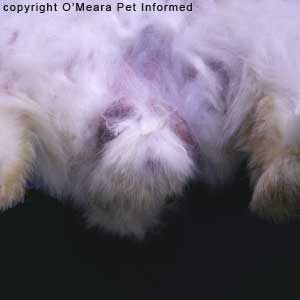
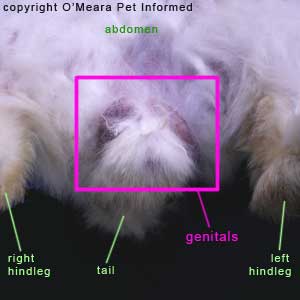
Sexing rabbits picture 1: This is an image of a male rabbit's genital region, taken from
afar. The rabbit has been photographed positioned on its back, which is why the tail of the rabbit is positioned towards the lower edge of the image. The rabbit's back feet are located
towards the right and left sides of the image.
Sexing rabbits picture 2: This is the same male rabbit photo as that shown in image 1 except that it has been
labeled. The rabbit's tail, feet and abdomen (belly) have all been labeled in green. The genital region of the male rabbit is the region marked out by the pink box: this is the region of the rabbit's body
(male or female) that you have to carefully examine in order to determine whether a rabbit is a male or a female.
All of the following male rabbit photos (sexing rabbits pictures 3-8) contain close up images of the male rabbit's genitals. They are all close-up photos of the reproductive structures contained within
the pink box indicated in image 2.
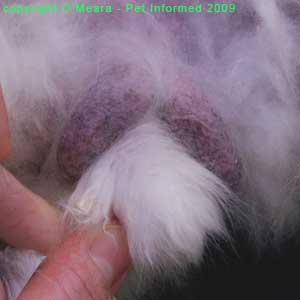
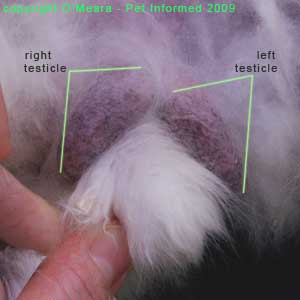
Sexing rabbits pictures 3 and 4: This is a close-up image of the male rabbit's genital region (the region
outlined with the pink box in image 2). The region of puffy, white fur that the rabbit sexing technician (see fingers in image)
is holding onto is where the rabbit's penis is located. The testicles of the rabbit, contained within
the thin-skinned scrota (the purple, sparsely-haired structures), are situated just above (forwards of) and to either
side of the rabbit's penis region. These testicles are labeled in rabbit sexing picture 4.
Author's note: The male rabbit's testicles are located between the penis and belly of the animal and not between the anus and penis of the animal as is seen in males of many other animal species. This unusual anatomical placement
can also be seen in many male marsupials (e.g. possums, kangaroos, wallabies).
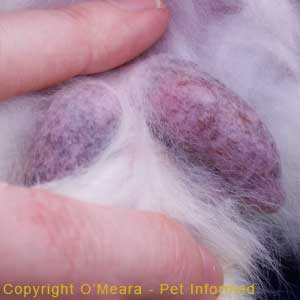
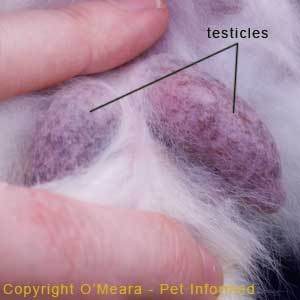
Sexing rabbits pictures 5 and 6: These rabbit sexing images contain close-up photos
of the male rabbit's testicles. The individual scrotal sacs are generally hairless (or only very thinly-furred),
pendulous, purplish-coloured and very easy to spot.
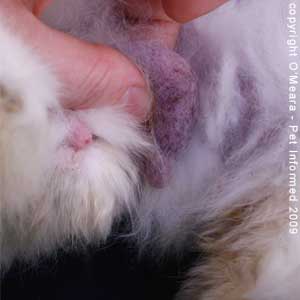
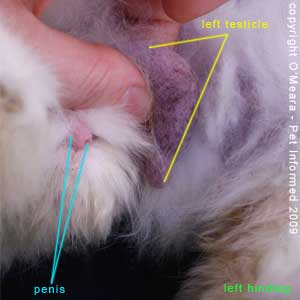
Rabbit sexing pictures 7 and 8: In this image, the rabbit's penis region (the region of puffed-out
white fur discussed under images 3 and 4) has been pushed to the right, revealing the rabbit's
left groin area (the region of pelvic skin located just inside of the left hind leg). This groin region
is where the testicle of the rabbit (left testicle - labeled) likes to hang. In contrast, the groin area
is sparsely-furred and smooth (contains no testes) in female rabbits (see rabbit sexing images
11-12, below).
The prepuce (penis-sheath) of the male rabbit is also visible in these images. It is the pointy, pink structure with the round hole in the end poking out of the white fur. The prepuce (which contains the rabbit's penis) has been
labeled as "penis" on image 8.
Sexing rabbits author's note: If one of the bulging, purple scrotal sacs lateral to (next to) the penis region is grasped, it is normally possible to feel a firm, smooth testicle sliding about just under the scrotal skin. This testicle moves freely back and forth within the scrotal skin
(the testis is not locked into place within the scrotal sac like that of the dog, cat and horse) and it can
sometimes be retracted up into the male rabbit's abdomen at will, making it hard to feel!
Important author's note: The inability to palpate a testicle in a suspect-male rabbit's
scrotal region does not necessarily rule out that rabbit as being a male. Rabbits are sometimes able to deliberately retract their testicles up into their abdominal cavities where they can not be palpated. This is particularly
common when the animal is very stressed (distressed, anxious rabbits may elevate their testicles out of harm's
way) and/or if it is a young animal (baby rabbit males are often misidentified as being females because no testicles are able to be palpated in the scrotal region). Waiting until the animal is relaxed is much more guarantee of a rabbit's testicles being able to be palpated.
It should be stated that the male rabbit's pendulous scrotal skin does usually remain hanging
in place in the animal's groin region, even if the male rabbit's testicles are retracted and
unable to be palpated. With practice, experienced rabbit handlers should be able to identify this
pendulous, floppy scrotal skin as male in nature, even if no testicles can be felt.
FEMALE RABBITS (DOES):
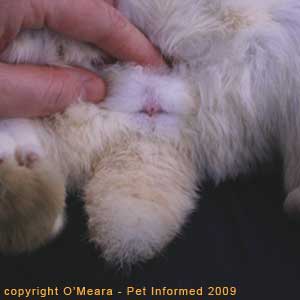
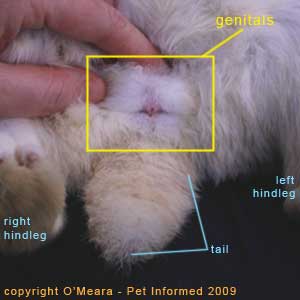
Sexing rabbits picture 9: This is an image of a female rabbit's genital region, taken from
afar. The rabbit has been photographed positioned on its back, which is why the tail of the rabbit is positioned towards the lower edge of the image. The rabbit's back feet are located
towards the right and left sides of the image.
Sexing rabbits picture 10: This is the same female rabbit photograph as that shown in image 9 except that it has been
labeled. The rabbit's tail and feet have been labeled in blue. The genital region
of the female rabbit is the region marked out by the yellow box: this is the region of the rabbit's body
(male or female) that you have to carefully examine in order to determine whether a rabbit is a male or a female.
The female rabbit's vulva (vaginal opening) is clearly visible in the center of this region (the
region delineated by the yellow box) - it is the pink, slit-like structure situated in the centre
of a bulging patch of fur, just beneath the animal's tail (the region of puffy fur located just underneath the rabbit handler's fingers).
All of the following female rabbit photos contain close up images of the female rabbit's genitalia. They are all close-up photographs of the reproductive structures contained within
the yellow box (indicated in image 10).
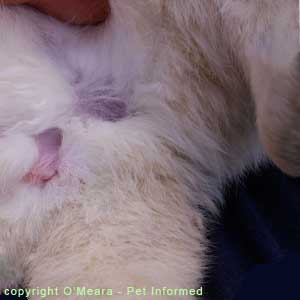
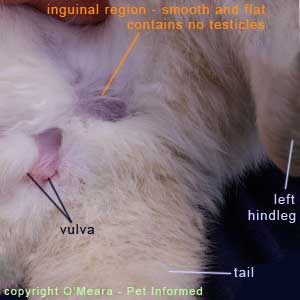
Rabbit sexing pictures 11 and 12: In this image, the female rabbit's vulval region (the region of
white fur discussed in images 9 and 10) has been pushed to the right, revealing the doe rabbit's
left groin area (the region of pelvic skin located just inside of the left hindleg - labeled as inguinal region
on image 12). This groin region is sparsely-furred and smooth (contains no testes) in female rabbits.
The vulva of the female rabbit is also visible in these images. It is the pink opening
with the vertical, slit-like hole in the end, positioned amidst the white fur. The vulva has been labeled
on image 11.
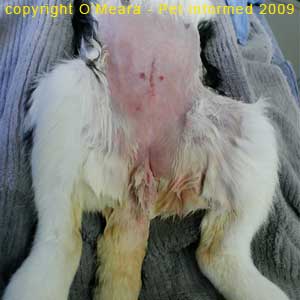
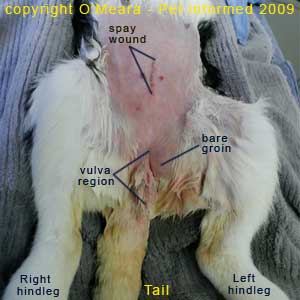
Rabbit sexing pictures 13 and 14: This is a photo of a female rabbit's belly immediately after the completion
of a rabbit spay procedure. The spay incision is the small line of sutures running down the rabbit's belly
(labeled in image 14 as "spay wound"). This image was included because, since the rabbit's abdomen
had to be clipped (shaved) in order for the surgical procedure to be performed, it enables the female
rabbit's groin region to be seen very clearly (a view that is unobstructed by the presence of fur).
You should be able to see that there are no testicles present in the female rabbit's groin region.
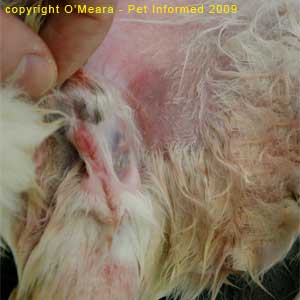
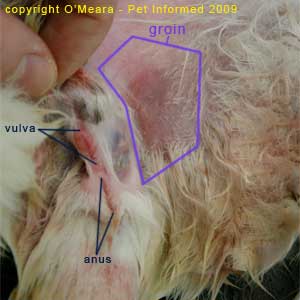
Rabbit sexing pictures 15 and 16: This is a close-up image of the above-pictured
female rabbit (rabbit in pictures 13 and 14), focusing on the rabbit's groin region.
The groin region is the region of pelvic skin located just inside of (medial to) the
crook of the rabbit's back leg and alongside the rabbit's genital region (anus and vulva region). It has been outlined in purple on picture 16. You should notice that groin region of this female
rabbit is flat and smooth as it should be (the same region in a male rabbit would contain a testicle).
Author's note: The rabbit's anus appears large and wide in this image, as compared to
previous images where the anus is barely visible. The reason for this is - because the
rabbit is under a general anaesthetic, its anus is very relaxed and therefore hangs open. Previous pictures where this is not the case were taken of non-anesthetized rabbits. You can
not normally see the anus of a wide-awake rabbit very clearly.
Important author's note: The inability to palpate a testicle in a rabbit's
groin region does not automatically make that rabbit a female. Male rabbits are sometimes able to deliberately retract their testicles up into their abdominal cavities where they can not be palpated. This is particularly
common when the animal is very stressed (distressed, anxious rabbits may elevate their testicles out of harm's
way) and/or if it is a young animal (baby rabbit males are often misidentified as being females because no testicles are able to be palpated in the scrotal region). Waiting until the animal is relaxed is much more guarantee of rabbit testicles being able to be palpated if the animal is a male.
It should be stated that the male rabbit's pendulous scrotal skin does usually remain hanging
in place in the animal's groin region, even if the male rabbit's testicles are retracted and
unable to be palpated. With practice, experienced rabbit handlers should be able to identify this
pendulous, floppy scrotal skin as male in nature, even if no testicles can be felt.
If you can feel testicles in your rabbit (step 1, above), then you probably do not need to go any further
with the sexing rabbits examination. Congratulations - your rabbit is a boy (called a buck). If you can
not see or feel testicles in your rabbit, then read on for more tips on determining the sex of your
pet bunny. The next step in the "sexing rabbits" examination is to examine the shape of your rabbit's genital opening.

2. Examine the shape of the rabbit's genital opening (vulva in females and penis in males).
The "external genital regions" of a rabbit are the female rabbit's vulval opening (vaginal entrance)
and the male rabbit's penis and testicles. Examination of the rabbit for the presence or absence of testicles has already been discussed in step 1 (above) and so now we move on to the examination of the rabbit's genital opening
(penis in males and vulva in females). The genital opening of the rabbit tends to be located somewhere amidst the centre of a thick puff of fur that can be found beneath the rabbit's tail (see
images 17 and 18 immediately below).


Sexing rabbits image 17: This is an image of a male rabbit's bottom. The genital
region of the rabbit has been outlined using a pink square. You should be able to see a large
puff of bulging, fluffy fur within the centre of this outlined box (just below the rabbit's tail). The rabbit's penis (not actually visible in this picture) is located in the centre of this patch of fur.
Sexing rabbits picture 18: This is an image of a female rabbit's bottom. The genital
region of the rabbit has been outlined using a yellow square. You should be able to see a large
puff of bulging, fluffy fur within the centre of this outlined box (just below the rabbit's tail). The rabbit's vulva (it is actually visible in this picture) is located in the centre of this patch of fur.
Author's note: The anus of the rabbit is not generally easy to mistake for a genital opening.
Rabbit anuses are usually held so tightly closed that they are almost invisible.
Look at the rabbit pictures below. These are close-up photos of the genital openings of two individual rabbits. The first rabbit shown is a male (buck) and the second rabbit shown, a young female (doe). It is important to note that these rabbits have both been photographed laying on their backs (this is why the
tail is located below the genitals on each of the images).
What you should notice from these rabbit sexing photos is that the genital opening (penis and/or penis-sheath opening)
of the male rabbit (rabbit pictures 19-22) is raised and pointed in shape (penis shaped) and that the
genital orifice (the hole in the end of the prepuce and/or penis) is shaped like a small, circular dot. This is in contrast to the genital opening (vulva or vulval opening) of the female rabbit (rabbit pictures 23-26), which
is flatter (flush with the skin) and shaped like a vertical slit.
MALE RABBITS (BUCKS):


Sexing rabbits pictures 19 and 20: In these images, the male rabbit's penis region (region of puffy fur discussed in image 17) has been pushed to the right, revealing the rabbit's left groin area (region of pelvic skin just inside of the left hindleg). This groin region is where the testicle of the male rabbit (left testicle - labeled)
likes to hang. The prepuce (sheath containing the rabbit's penis) of the male rabbit is also visible in these images. It is the pointy, pink structure with the round hole in the end poking out of the white fur. The prepuce (which contains the rabbit's penis) has been
labeled as "penis" on image 20.
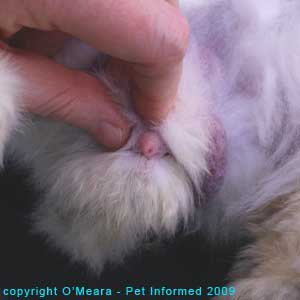
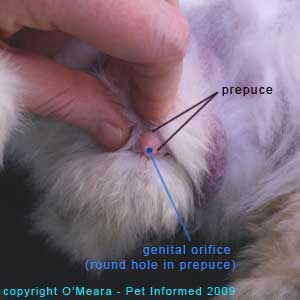
Sexing rabbits pictures 21 and 22: These are close-up images of the male rabbit's penis region (region of puffy fur discussed in image 17). The prepuce of the male rabbit is clearly visible in
the centre of this image (centre of the puffy fur region). It is a pointed, pink structure that is elevated above the
level of the rabbit's skin. It contains a central hole (prepuce opening) that is circular in
shape (a small, black "dot"). The prepuce contains the rabbit's penis.
FEMALE RABBITS (DOES):
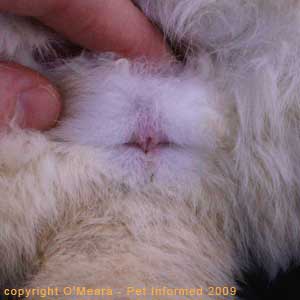
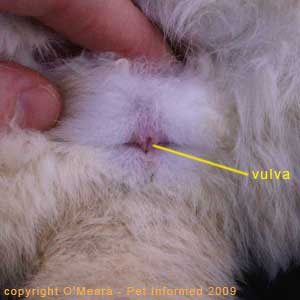
Sexing rabbits pictures 23 and 24: These are close-up images of the female rabbit's vulva region (region of puffy fur discussed in image 18). The vulval slit of the female rabbit is clearly visible in
the centre of this image (centre of the puffy fur region). It is a pink opening that is flush-with or slightly
elevated-above the level of the rest of the rabbit's skin. It contains a central hole (vulval opening) that is elongated in shape and orientated vertically (i.e. a vertical "slit").
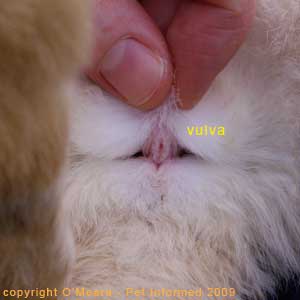
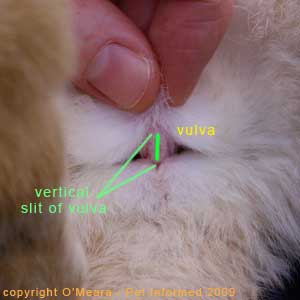
Sexing rabbits pictures 25 and 26: These are close-up images of the female rabbit's vulval region (region of puffy fur discussed in image 18). The vulval slit of the female rabbit is clearly visible in
the centre of this image (centre of the puffy fur region). By pulling the fur at the tip of the vulva up gently, the linear, slit-like shape of the female rabbit's vulva
can be more easily appreciated. It is a pink opening that is flush-with or slightly
elevated-above the level of the rest of the rabbit's skin. It contains a central hole (vulval opening) that is elongated in shape and orientated vertically (a vertical "slit").
What you should have noticed from these rabbit sexing photos is that the genital opening (penis and/or penis-sheath opening)
of the male rabbit (rabbit pictures 19-22) is raised and pointed in shape (penis shaped) and that the
genital orifice (the hole in the end of the prepuce and/or penis) is shaped like a small, circular dot. This is in contrast to the genital opening (vulva or vulval opening) of the female rabbit (rabbit pictures 23-26), which
is flatter (flush with the skin) and shaped like a vertical slit.

3. Gently roll the rabbit's genital opening outwards to see if a penis appears (male) or not (female).
Although examination of the shape of the rabbit's genital opening (discussed in step 2, above) is generally enough to classify the rabbit as being either male or a female, some rabbits will still
manage to remain ambiguous in gender. This is particularly the case in young rabbits.
In these situations, the final test that you can perform in order to determine the rabbit's gender is to place your fingers either side of the rabbit's genital opening and very gently roll the genital opening outwards (such that it opens). If the rabbit is a male, the pointy
tip of the penis should rise and protrude outwards through the prepuce (penis sheath) opening
(see sexing rabbits images 27-33). If the rabbit is a female, the vertical slit-like shape of the
vulva/vagina should persist, despite the rolling-out manipulation, and no penis should
appear (see sexing rabbits pictures 34-39).
IMPORTANT: If attempting this kind of genital examination, be very gentle with your rabbit.
Rabbit genitals can be injured if such an examination is performed too forcibly. If you are
at all unsure about how to go about performing this kind of genital examination, please
get your vet to show you how to perform it before you do so on other rabbits.
IMPORTANT: When sexing rabbits, do not attempt to perform this step of the rabbit sexing examination on very immature, prepubescent rabbits (under 3-4 months of age). Attempting to expose or pull out the penis of prepubescent male rabbits is dangerous for them. Such animals are not capable of exposing their penis and attempting to do so forcibly can damage the penis.
MALE RABBITS (BUCKS):


Sexing rabbits pictures 27 and 28: These are close-up images of the male rabbit's penis region (region of puffy fur discussed in previous images and sections). The prepuce (penis sheath) of the male rabbit is clearly visible in the centre of this image (centre of the puffy fur region). It is a pointed, pink structure that is elevated above the
level of the rabbit's skin. It contains a central hole (prepuce opening) that is circular in
shape (a small, black "dot"). The prepuce contains the rabbit's penis.
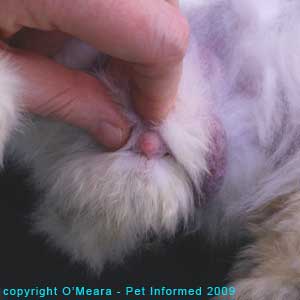
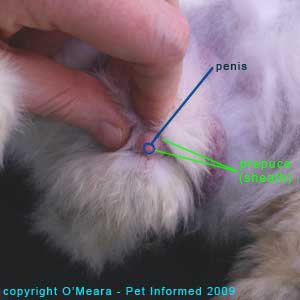
Pictures of rabbits 29 and 30: These are close-up images of the male rabbits penis region (region of puffy fur discussed in previous images and sections). The rabbit sexing technician
(rabbit handler) is gently rolling the prepuce sheath open. You can just start to see the tip of the rabbit's penis coming out through the round hole in the end of the prepuce.
The circular
edge of the prepuce's opening has been traced in blue in image 30. The pointy pink object located just
inside of this blue circle is the tip of the rabbit's penis.
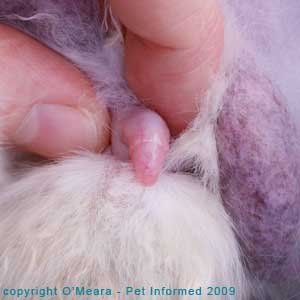
Sexing rabbits 31: This is an image of the male rabbit's penis once it is fully
protruded from the prepuce sheath. It is long and pointed.
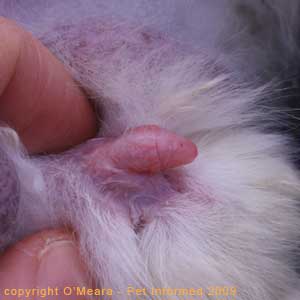
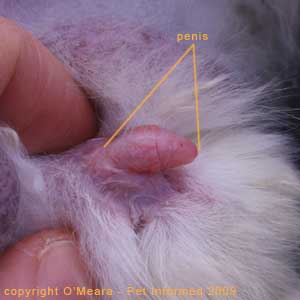
Sexing rabbits 32 and 33: These are some side-on images of the male rabbit's penis once it has become fully
protruded from the prepuce sheath. The penis is long and pointed and curves slightly. It is also elevated
above the level of the rabbit's skin.
FEMALE RABBITS (DOES):


Sexing rabbits pictures 34 and 35: These are close-up images of the female rabbit's vulval region (region of puffy fur discussed in previous images). The vulval opening of the female rabbit is clearly visible in the centre of this image (centre of the puffy fur region). It is a pink opening that is flush-with or slightly
elevated-above the level of the rest of the rabbit's skin. It contains a central hole (vulval opening) that is elongated in shape and orientated vertically (i.e. a vertical "slit").
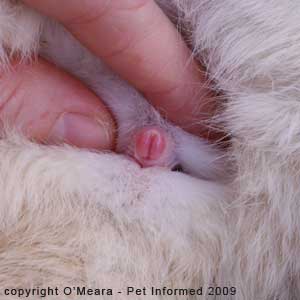
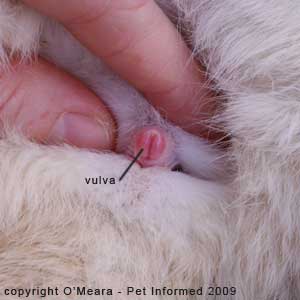
Pictures of rabbits sexing 36 and 37: These are close-up images of the female rabbit's vulva region (region of puffy fur discussed in previous images and sections). The rabbit sexing technician
(rabbit handler) is gently rolling the vulval lips open. The inner lining of the vagina
(termed the mucosa) is shiny and pink in appearance and retains its vertical slit-like
shape, despite being rolled open. No penis appears as the vulval lips are rolled open, confirming that the animal is, indeed, a female rabbit.
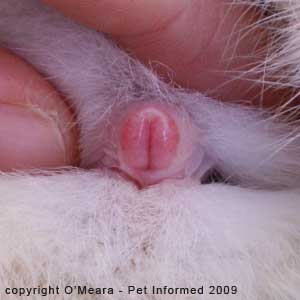
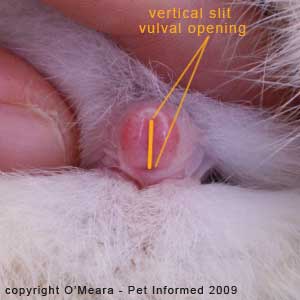
Sexing rabbits photos 38 and 39: These are magnified, close-up images of the female rabbit's vulva region. The rabbit sexing technician
(rabbit handler) is gently rolling the vulval lips open. The inner lining of the vagina
(termed the mucosa) is shiny and pink in appearance and retains its vertical slit-like
shape. No penis appears as the vulval lips are rolled open, confirming that the animal
is a female rabbit (called a doe).

To go from this sexing rabbits page to our great homepage, click here.
To go from this rabbit sexing page to our sexing animals page, click here.

Copyright September 25, 2009, Dr. O'Meara BVSc (Hon), www.pet-informed-veterinary-advice-online.com.
All rights reserved, protected under Australian copyright. No images or graphics on this Pet Informed website may be used without written permission of their owner, Dr. O'Meara BVSc (Hon).






























